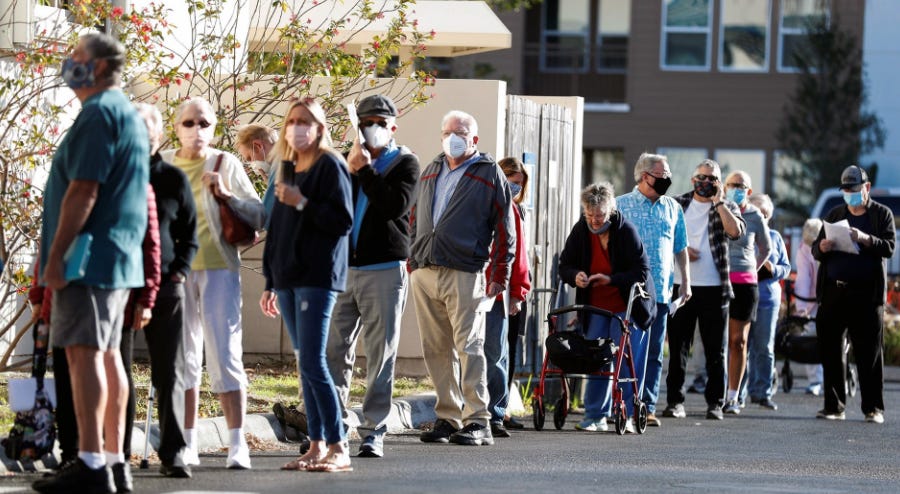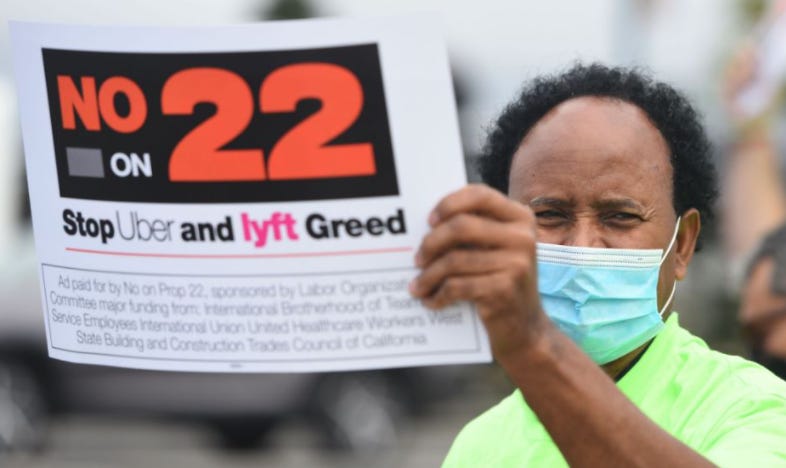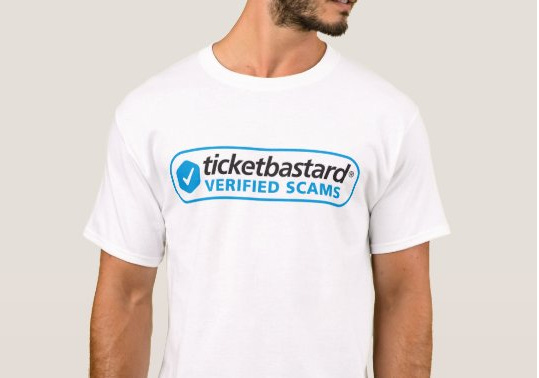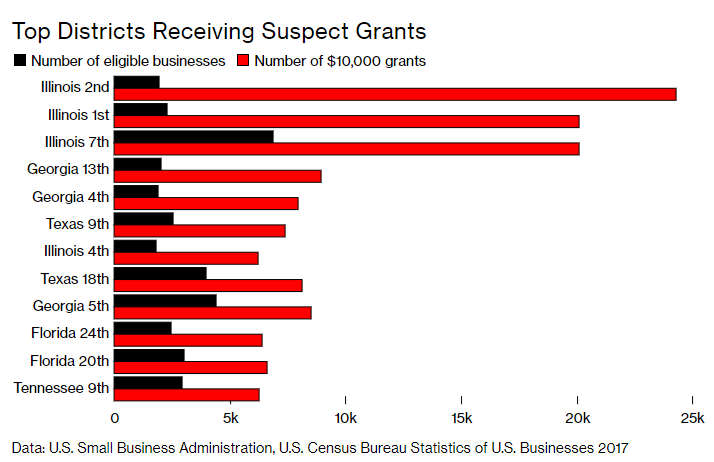Jump the Line
Vaccines, Prop 22, App Tracking, Ticketmaster, Disaster Grants, and Securities Fraud
Vaccines
Wealth inequality in America has been rising steadily for 50 years, so it was only a matter of time before we got news reports of rich people jumping the line for COVID-19 vaccines. And here we are:
MorseLife has made scarce coronavirus vaccines — provided through a federal program intended for residents and staff of long-term-care facilities — available not just to its residents but to board members and those who made generous donations to the facility, including members of the Palm Beach Country Club, according to multiple people who were offered access, some of whom accepted it.
A nursing home provider in Florida has been handing out vaccine doses to wealthy donors and board members, while a couple hours away Florida’s most vulnerable seniors can’t even make appointments to get vaccinated:
Judy Swan, an 80-year-old resident of Tampa, was one of the thousands of people who spent the day calling the county’s hotline to secure appointments for her and her 82-year-old husband. The process was “frustrating,” she said. “Poorly planned and executed.”
Swan estimated calling hundreds of times, continuously meeting a busy signal or being disconnected. When she finally had her appointment request accepted online, the website crashed.
Also, because Florida is using Eventbrite (!) to schedule vaccine appointments in some areas, scammers are using fake listings to steal money from desperate seniors:
Fake Eventbrite sites, posing as local health departments and charging people for vaccination appointments, led to some seniors showing up to Pasco points saying they had a slot, only to be told it was fraudulent, said department spokeswoman Melissa Watts.
The department isn’t sure how many people signed up through the fake website, Watts said. “There could still be people thinking they have appointments and they don’t. It’s really a shame.”
Another avenue the wealthy have to skip the line are concierge doctors, who may be willing to circumvent the law to help their clients:
Concierge doctors market themselves and pride themselves on delivering results like this. In return for the subscription-like fee, these doctors limit their practices to just a few dozen families, offering them introductions to best-in-class specialists, home visits, and their cellphone numbers to call or text 24/7.
While it’s unsurprising wealthy Americans have better access than the rest of us to lifesaving medicine, most abuse of the system will be more mundane - medical workers with access to vaccines giving it to friends:
A California hospital is acknowledging it gave the COVID-19 vaccine to “several” people who are not online healthcare workers—after a woman took to Facebook to brag that she got a dose because a family member had connections.
…or turning away qualified candidates so they can administer doses out the back door in secret:
Hamilton County officials say miscalculations led to late-evening vaccinations in the Tennessee Riverpark in Chattanooga on New Year’s Eve, long after people were turned away and told there were no more vaccines available.
There was a huge turnout, with long lines of cars waiting to access the park and many people being turned away.
According to WRCB, they acted on a tip and returned to Riverpark after dark to find cars leaving the property. The people in those vehicles told WRCB family members or friends who were helping to administer the vaccines called to tell them there were extra doses and they should come to receive a dose.
Much of the early vaccine news has been depressing - I try not to think about all the health workers who are refusing it. It doesn’t give the wealthy or the well-connected the right to step in line before the people who need it.
Prop 22
It’s been another busy week for food and grocery delivery companies, as Prop 22 continues to impact workers in California. First, the bad news - grocery store chains have moved to lay off in-house delivery drivers, some of them union, in favor of third-party gig services:
Hundreds of California’s in-house grocery store delivery drivers are set to be laid off by massive chain Albertsons and its Los Angeles subsidiaries on February 27, according to multiple reports. Instead, Albertsons, Safeway, Vons, and Pavilions locations across Southern California will utilize third-party delivery apps that regulate its drivers as independent contractors, not employees.
But the good(?) news is that Prop 22 has forced gig companies to stop impersonating restaurants they don’t have relationships with to steal their revenue:
A California law that took effect on January 1 has prompted the removal of tens of thousands of restaurants from food delivery apps like SF-based Uber Eats, DoorDash, Postmates, and Caviar.
How big was this problem prior to the legislation? Well, according to the WSJ, less than 20% of restaurants on Postmates were actually affiliated with the app:
The impact on Postmates, whose largest market is Los Angeles, could be disproportionately large. Postmates has 700,000 merchants on its platform, according to a September regulatory filing from Uber.
Postmates says it has 40,000 unpartnered merchants in California alone. The bigger problem is, of course, that the other 49 states do not have laws forcing gig companies to stop impersonating restaurants.
I wrote about this last year - some restauranteurs are aware and can take steps to remove erroneous gig delivery listings, but many have no recourse or don’t know it’s happening. Gig companies are pretending they have hundreds of thousand of restaurant relationships to juice their valuations. These are the companies Wall Street and Silicon Valley believes should be the future of food delivery and dining in America. For now, it seems they’ve bet on the right delivery horse.
App Tracking
Last week I wrote about the feud between Facebook and Apple over Apple’s upcoming changes to iPhone app tracking. Watching big tech’s most aggressive violator of privacy throw a tantrum does feel good, but there are millions of other, non-Facebooks in the App Store, and Apple’s changes impact them as well. How are they going to deal with it? The answer, it seems, is to find other ways to invade your privacy without - hopefully - getting caught:
Some app makers say they plan to use invasive tracking techniques such as “device fingerprinting” to work around the new restrictions — even though doing so risks getting them thrown off the App Store if they are caught.
[…]
Device fingerprinting can be used to recognise repeat visits from the same smartphone, even across multiple apps. The technique, which is banned by Apple’s App Store rules but can be difficult to detect, works by correlating a combination of a device’s hardware and software characteristics, configurations such as internet connections, battery or language settings, and patterns of usage.
Another way to track people between apps is if they use the same email address to sign up for various services and games. “Hashed emails”, whereby addresses are turned into a string of letters and numbers, allow companies to share user details without directly handing over an individual’s email address to their partners.
App makers may get banned from the App Store, but it’s a calculated risk - major apps like Uber, Facebook, Google, and others have been caught violating Apple’s TOS multiple times and negotiated their way back onto the store.
In this case, Apple does seem to be trying to give its iPhone users increased control over their data privacy - though arguably that horse is already out of the barn. Companies have spent the last decade collecting immeasurable amounts of behavioral data from users with or without their consent. Should Apple be the judge, jury and executioner in its App Store? We need a deeper look at how Apple runs its consumer business, and whether it’s equipped to do so.
Ticketmaster
No one likes Ticketmaster. They tack on a 33% “service fee” for every concert you attend, for some reason. After their merger with Live Nation, the resulting conglomerate controls as much as 70% of the event market in the US. You don’t get that big by accident, of course, and this week the company admitted it did some very illegal stuff to snuff out a competitor:
The charges against Ticketmaster come 26 months after Zeeshan Zaidi, the former head of Ticketmaster’s artist services division, pled guilty in a related case to conspiring to hack the rival company and engage in wire fraud. According to prosecutors, the former rival employee emailed the login credentials to Zaidi and another Ticketmaster employee.
Basically, in 2012 a senior employee left Ticketmaster rival CrowdSurge - which would later become Songkick - and stole a bunch of confidential information, including employee logins. Rather than, you know, reporting this to the authorities, Ticketmaster had meetings and trained its staff how to exploit CrowdSurge’s systems to identify upcoming concerts and try to steal the business. Then Ticketmaster promoted the thief and spent years doing corporate espionage, running Songkick out of business in 2017.
Ticketmaster is going to pay a $10 million dollar fine and set up an ethics and compliance program as part of a deferred prosecution agreement. The guy who stole the data pled guilty to conspiracy to hack and wire fraud. If the penalty seems mild to you, given the size of Live Nation and the fact it put a rival out of business with a years-long illegal conspiracy, that’s because it is. But Live Nation is big, has billions of dollars, and I guess a couple of criminal guilty pleas is better than nothing.
On a personal note - Songkick was purchased by Warner Music after it went out of business and is now the best app for concert discovery. I use it religiously - or I did, when concerts were a thing - and if you enjoy live music you should, too. So, weirdly, something good did come out of Ticketmaster’s criminal behavior? Never thought I’d see those words in that order.
Disaster Grants
When Congress passed the CARES Act last year, it set aside a pool of money for small dollar “disaster grants” which would be administered by the SBA and give awards ranging from $1,000 to $10,000 dollars to gig workers and small businesses. Many stories have been written about PPP loan fraud - scammers spending government cash buying boats and Lambos. But, until late last year, little was known about the recipients of the much smaller disaster grants:
The payouts on South Hermitage reveal the pervasiveness of fraud in the $214 billion Economic Injury Disaster Loan program, meant to help businesses hurt by Covid-19. In hundreds of neighborhoods in Chicago and across the country, the records show government aid flowing to statistically impossible numbers of small businesses, many of which appear on closer inspection to be fictional.
Back in August, Bloomberg Businessweek did the math and discovered discrepancies between the number of registered businesses and entities receiving EIDL grants:
There were early signs that the program wasn’t going smoothly:
The SBA’s inspector general, Hannibal “Mike” Ware, warned of “potentially rampant fraud” in the program in July. Bloomberg News subsequently reported how applying for phony grants went viral in some neighborhoods over the summer, how foreign scammers plundered loans using fake IDs and how even someone posing as President Donald Trump made off with $5,000.
Hang on - the inspector general of the SBA is named Hannibal and goes by Mike? IG of a major government agency seems like the perfect use case for an intimidating name, but what do I know.
Anyhow, with the SBA data released, it’s now clear that $1.3 billion dollars’ worth of excess grants were issued, though the degree of fraud in each filing may be impossible to know.
That said! I do not have a strong objection to people who were suffering in the midst of a pandemic and economic collapse using the government’s stupidity against it and getting money for survival. Some of them, though, I don’t know man:
Thousands more grants and loans went to self-described farmers operating in densely populated cities, including more than $150,000 approved for a pair of poultry farms in apartment 13D of a swanky high-rise in Manhattan’s Greenwich Village.
If the door to 13D doesn’t open on a scene from a Warner Brothers cartoon with clucking hens stacked to the ceiling, the DoJ may need to have a word. Oh, and Congress has given the SBA an additional $20 billion dollars in grants in the latest aid package, so here’s hoping they end up going to businesses who need the money, and not high-rise poultry tycoons.
Cyberpump: 2077
Two different law firms announced [in December] they were filing suit against CD Projekt, alleging the company violated securities law by misleading investors (and everyone else) about the state of Cyberpunk 2077 and whether it would be playable on current-generation consoles, the PlayStation 4 and XBox One.
If promising a game will be good and not delivering on it is securities fraud, I hope the studio behind Star Citizen never goes public.
Securities Fraud
What I’d rather talk about in Matt Levine’s column, however, is his dissection of a paper from Emily Strauss of Duke Law dealing with the securities fraud industry, and by that I mean the certain type of lawyer who has carved out suing publicly traded companies:
Securities litigation is a virtually inevitable fact of life for any public company. Often, investors sue because the firm’s managers engaged in fraud that directly harmed the shareholders – say, by doctoring the firm’s financials, or lying about known business prospects. However, shareholders also sue their companies when those companies engage in conduct that primarily harms a different set of constituents. When a drug on the market proves to have dangerous side effects, a faulty car battery bursts into flames, or an oil rig explodes, it’s difficult to say that the most direct victims are the companies’ shareholders. Yet shareholders commonly sue under the federal securities laws based on precisely this kind of conduct, on the ground that the managers should have better disclosed the underlying facts, and investors were harmed by the resulting drop in stock price because they did not.
This is an important distinction - these days, companies are more likely to be held accountable through shareholder lawsuits than any sort of law enforcement investigation on behalf of consumers. If your car battery bursts into flames and you get hurt, you might receive a modest settlement from the manufacturer for your troubles. But if your story makes the New York Times and the manufacturer’s stock price goes down, some lawyers are going to sue them and make millions of dollars for themselves and their clients - shareholders of the car battery company. Seems…wrong, no?
Strauss takes it a step further and argues shareholder lawsuits have become such a windfall that owners of company stock have very little motivation to police its behavior - since they know they can cash in if they get caught doing anything wrong, or even saying something wrong!
Levine points out one problem - they’re stealing from themselves, sort of?
I am not entirely on board with this theory. One problem with shareholder lawsuits generally is that the shareholders are suing the company, and if they win they take money from the company; it was their money to begin with, so it’s kind of an unsatisfying form of compensation. If you are a shareholder, suing the company for losing money is some consolation for the losses, but not nearly as good as not losing money in the first place.
Then there’s the case of Pintrest, which was accused of racial discrimination and toxic work culture back in June. Which is bad! The former COO of Pintrest sued alleging discrimination and retaliation, and got a bunch of money. Which is good!
However, then the shareholders got involved:
Pinterest shareholders are suing the company’s top executives, including CEO Ben Silbermann, for allegedly enabling a culture of discrimination. The toxic work environment has hurt the company’s reputation, leading to a user boycott and financial harm, the complaint alleges.
The problem is, they brought the lawsuit in November, when Pintrest’s share price was at an all time high so…uh? The lawyers bringing the Pintrest suit won $300 million in a similar lawsuit against Google which begs the question - who is this really helping? The obvious answer is the lawyers, who are absolutely swimming in cash. While it’s good to give shareholders of a company a tool to punish mismanagement or criminal behavior, it’s important to keep your eye on who’s actually cashing the settlement checks. It’s not usually the employees who suffered discrimination, or the victims of a faulty car battery. It’s the lawyers, and the big shareholders who employ them to sue over every misstep.
Short Cons
NY Times - “The Northwell lawsuits each sought an average of $1,700 in unpaid bills, plus large interest payments. They hit teachers, construction workers, grocery store employees and others, including some who had lost work in the pandemic or gotten sick themselves.”
NY Times - “Russian hackers may have piggybacked on a tool developed by JetBrains, which is based in the Czech Republic, to gain access to federal government and private sector systems in the United States.”
WSJ - “SoftBank, the world’s largest technology investor, was an early backer of Katerra. The bailout marks the second time this year that SoftBank has increased its investment in the firm.”
Tips, thoughts, or shareholder lawsuit proceeds to scammerdarkly@gmail.com.





